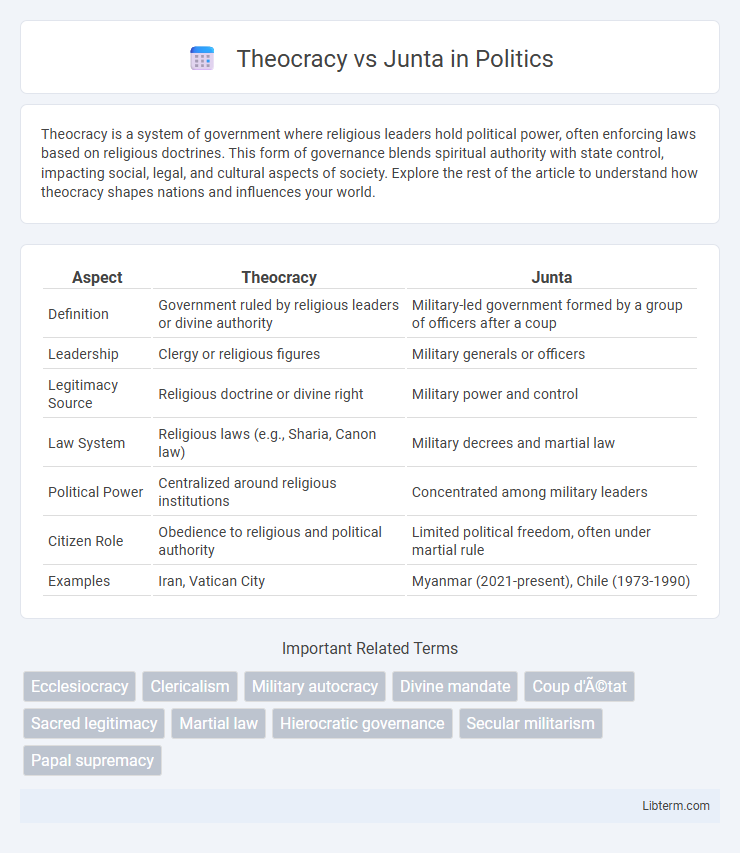Theocracy is a system of government where religious leaders hold political power, often enforcing laws based on religious doctrines. This form of governance blends spiritual authority with state control, impacting social, legal, and cultural aspects of society. Explore the rest of the article to understand how theocracy shapes nations and influences your world.
Table of Comparison
| Aspect | Theocracy | Junta |
|---|---|---|
| Definition | Government ruled by religious leaders or divine authority | Military-led government formed by a group of officers after a coup |
| Leadership | Clergy or religious figures | Military generals or officers |
| Legitimacy Source | Religious doctrine or divine right | Military power and control |
| Law System | Religious laws (e.g., Sharia, Canon law) | Military decrees and martial law |
| Political Power | Centralized around religious institutions | Concentrated among military leaders |
| Citizen Role | Obedience to religious and political authority | Limited political freedom, often under martial rule |
| Examples | Iran, Vatican City | Myanmar (2021-present), Chile (1973-1990) |
Introduction to Theocracy and Junta
Theocracy is a form of government where religious leaders control political power, basing laws and policies on religious doctrines. In contrast, a junta is a government led by a committee of military officers who seize control after a coup d'etat, often ruling through authoritarian means. Both systems centralize authority but differ fundamentally in their sources of legitimacy and governance structures.
Defining Theocracy: Rule by Divine Authority
Theocracy is a system of government where authority is derived from divine or religious principles, often led by clergy or religious leaders believed to be divinely guided. This form of governance enforces laws based on sacred texts or religious doctrines, blending spiritual legitimacy with political power. Theocratic rule contrasts with a junta, which is led by military officers or a small group seizing control rather than divine sanction.
Exploring Junta: Governance by Military Force
Junta governance is characterized by control exerted through military force, where a group of high-ranking officers seizes power, often following a coup d'etat. Unlike a theocracy, which bases authority on religious leadership, a junta enforces rule through military discipline and strategic suppression of opposition. This form of regime typically prioritizes security, stability, and centralized command, relying on armed forces to maintain order and legitimacy.
Historical Examples of Theocratic Regimes
Historical examples of theocratic regimes include the Vatican under Papal rule, Iran's Islamic Republic established after the 1979 revolution, and Tibet governed by the Dalai Lamas before Chinese annexation. These theocracies centralized religious authority as the primary source of political power, intertwining governance with divine law. Unlike military juntas such as Myanmar's State Peace and Development Council, theocratic regimes derive legitimacy from spiritual leadership rather than military control.
Notable Military Juntas in World History
Notable military juntas in world history include the Greek Junta (1967-1974), Chile's military dictatorship under Augusto Pinochet (1973-1990), and Myanmar's ongoing military rule since 1962, showcasing military control sans religious governance typical of theocracy. These regimes centralize power within military elites, contrasting sharply with theocratic systems where religious leaders dictate state policies. The juntas often suppress political opposition and civil liberties through martial law and military enforcement, reflecting a secular authoritarian form of governance.
Core Differences in Power Structure
Theocracy centralizes power in religious leaders or institutions, where governance is based on divine guidance or sacred laws, often blending spiritual authority with political control. Junta consists of a group of military officers who collectively hold power, typically after seizing control through a coup d'etat, emphasizing hierarchical command and secular, force-based authority. The core difference lies in the source of legitimacy: theocracy derives authority from religious doctrine, while junta relies on military dominance and coercion.
Impact on Civil Liberties and Human Rights
Theocracy often enforces strict adherence to religious laws, severely restricting freedom of expression, religion, and gender rights, which can lead to systemic human rights abuses under the guise of divine authority. Junta regimes, typically military dictatorships, impose martial law that suppresses political dissent, free speech, and assembly, frequently resulting in arbitrary detentions, torture, and extrajudicial killings. Both systems concentrate power in undemocratic hands, causing significant erosion of civil liberties and international condemnation for widespread human rights violations.
Public Support and Legitimacy in Both Systems
Theocracy often derives its legitimacy from religious authority and divine right, fostering public support rooted in shared faith and moral values. In contrast, a junta bases its control on military power and coercion, frequently facing challenges in gaining genuine public legitimacy beyond enforced compliance. Public support in theocracy tends to be more stable due to ideological alignment, whereas juntas rely heavily on repression and may encounter resistance or civil unrest over time.
Global Perceptions and Contemporary Relevance
Global perceptions of theocracy often highlight its foundation on divine authority, which can lead to policies shaped by religious doctrines, affecting human rights and pluralism debates. In contrast, military juntas are frequently associated with authoritarian control, political instability, and suppression of civil liberties, drawing international criticism and sanctions. Contemporary relevance lies in how both systems challenge democratic governance, influencing geopolitical alliances and global discourse on sovereignty and legitimacy.
Conclusion: Comparative Analysis and Future Outlook
Theocracy centers governance on religious authority, integrating spiritual laws with state policies, while a junta involves military control, with power maintained through force and hierarchical command. Both systems often limit political pluralism and suppress dissent but differ in ideological foundations and legitimacy claims. Future trends suggest potential shifts toward hybrid regimes combining religious influence and military power, especially in regions facing political instability and socio-religious tensions.
Theocracy Infographic

 libterm.com
libterm.com